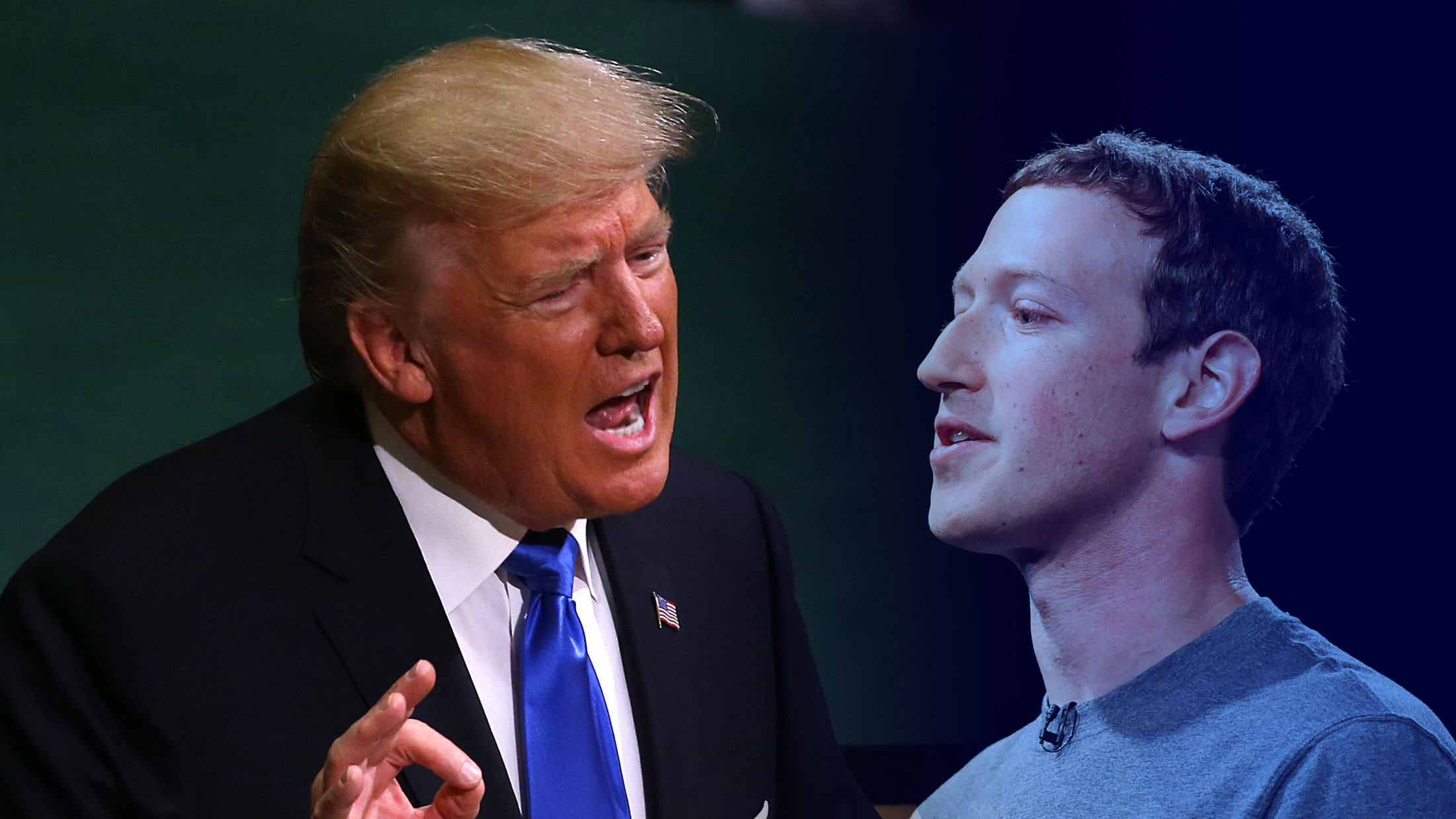Zuckerberg's Next Chapter: Navigating A Trump Presidency

Table of Contents
The Impact of Trump's Policies on Meta
The Trump administration significantly impacted Meta's operations, creating a challenging environment for the company's growth and stability.
Increased Regulatory Scrutiny
The Trump presidency ushered in a new era of increased regulatory scrutiny for Meta, encompassing various aspects of its business.
- Increased antitrust investigations: The Department of Justice launched investigations into Meta's monopolistic practices, focusing on concerns regarding its dominance in social networking and its acquisition of Instagram and WhatsApp.
- Data privacy regulations: While the GDPR (General Data Protection Regulation) was enacted before Trump took office, its impact intensified during his tenure, prompting Meta to adapt its data handling practices. The California Consumer Privacy Act (CCPA) further complicated the landscape.
- Potential changes to Section 230: The Trump administration repeatedly threatened to alter Section 230 of the Communications Decency Act, a law that shields online platforms from liability for user-generated content. This uncertainty created significant challenges for Meta's content moderation policies.
Meta faced significant financial repercussions, including hefty fines and ongoing legal battles stemming from these regulatory actions. The threat of further legislation loomed large, forcing the company to invest heavily in legal resources and compliance efforts. The uncertainty around Section 230, in particular, created a climate of fear amongst tech companies regarding their potential legal liability.
Political Advertising and Disinformation
The spread of misinformation and foreign interference in elections became major concerns during the Trump presidency, placing immense pressure on Meta to improve its content moderation strategies.
- Challenges in combating misinformation: The platform struggled to effectively address the flood of false and misleading information circulating on its platforms, especially regarding political issues. This contributed to public criticism and calls for stricter regulation.
- Debates surrounding political advertising transparency: The lack of transparency in political advertising on social media platforms fueled concerns about the influence of undisclosed foreign actors and the potential for manipulation of public opinion.
The Trump administration's ambiguous stance on regulating political advertising further complicated matters. While expressing concerns about foreign interference, the administration also resisted calls for stricter regulations that could potentially impede free speech. This created a difficult balancing act for Meta, requiring the company to develop sophisticated content moderation algorithms and policies while simultaneously navigating the political minefield of free speech debates.
International Relations and Geopolitical Risks
Trump's foreign policy significantly impacted Meta's international operations, creating a complex web of geopolitical challenges.
- Impact of Trump's trade wars: Trade tensions with countries like China impacted Meta's global supply chains and expansion plans.
- Challenges in different regulatory environments: Navigating the diverse and often conflicting regulatory landscapes of different countries presented significant challenges to Meta's global reach.
Trump's unpredictable foreign policy created uncertainty for Meta's international business. Changes in global alliances and diplomatic tensions created new risks and necessitated a more cautious and adaptable approach to international expansion. The company needed to tailor its strategies to the specific geopolitical context of each region, constantly navigating evolving relationships and trade policies.
Zuckerberg's Strategic Responses
In response to the challenges posed by the Trump presidency, Zuckerberg implemented various strategies to protect Meta's interests and navigate the turbulent political climate.
Adapting to a Changing Regulatory Landscape
Meta actively sought to adapt to the changing regulatory landscape by investing in compliance and transparency initiatives.
- Investments in data privacy initiatives: Meta invested significantly in enhancing its data privacy infrastructure and improving transparency regarding its data collection practices.
- Examples of Meta's efforts to comply with new regulations: The company implemented various measures to comply with GDPR and CCPA, including providing users with greater control over their data and enhancing its data security protocols.
These efforts were crucial in mitigating potential penalties and maintaining a positive relationship with regulators. Meta also engaged in lobbying efforts to influence legislation and advocate for policies favorable to its business interests.
Content Moderation Strategies and Public Relations
Meta's response to the misinformation crisis included refining its content moderation strategies and engaging in public relations efforts to rebuild trust.
- Evolving content moderation policies: The company implemented stricter content moderation policies to address the spread of disinformation and hate speech.
- Efforts to engage with critics and rebuild public trust: Zuckerberg engaged in public appearances and dialogues to address criticism and attempt to rebuild public trust.
However, Meta faced ongoing criticism regarding its content moderation effectiveness, highlighted by continued instances of harmful content escaping detection. The company's public relations efforts faced an uphill battle, battling a perception that it was insufficiently responsive to the problem of misinformation and its role in political polarization.
Long-Term Vision and Future Strategies
To mitigate future risks, Zuckerberg has emphasized a long-term vision focused on technological innovation and diversification.
- Metaverse development: Meta's significant investments in the metaverse represent a strategic shift toward creating a new digital ecosystem, less reliant on traditional social media models.
- Diversification of revenue streams: Exploring new revenue streams beyond advertising reduces the company's vulnerability to regulatory changes and shifts in user behavior.
This long-term strategy aims to position Meta for future success, regardless of political and regulatory changes. Investing in cutting-edge technologies, diversifying revenue, and developing new platforms offer a path to future resilience and growth.
Conclusion
Zuckerberg's ability to successfully navigate the complex challenges posed by a Trump presidency will significantly shape Meta's future. His strategic responses – from adapting to regulatory changes to evolving content moderation strategies – will determine the company's continued success and its role in the digital landscape. Understanding Zuckerberg's Next Chapter: Navigating a Trump Presidency is crucial for anyone interested in the intersection of technology, politics, and the future of social media. Learn more about the ongoing implications of this dynamic relationship by exploring further resources on [link to relevant articles/reports].

Featured Posts
-
 Trumps Ukraine Proposal Kyivs Urgent Response Needed
Apr 22, 2025
Trumps Ukraine Proposal Kyivs Urgent Response Needed
Apr 22, 2025 -
 Los Angeles Palisades Fire A List Of Celebrities Whose Homes Were Damaged Or Destroyed
Apr 22, 2025
Los Angeles Palisades Fire A List Of Celebrities Whose Homes Were Damaged Or Destroyed
Apr 22, 2025 -
 Higher Stock Prices Higher Risks Investors Face More Pain
Apr 22, 2025
Higher Stock Prices Higher Risks Investors Face More Pain
Apr 22, 2025 -
 Investment Opportunities A Map Of The Countrys Promising Business Regions
Apr 22, 2025
Investment Opportunities A Map Of The Countrys Promising Business Regions
Apr 22, 2025 -
 Open Ai Under Ftc Scrutiny Chat Gpts Future In Question
Apr 22, 2025
Open Ai Under Ftc Scrutiny Chat Gpts Future In Question
Apr 22, 2025
